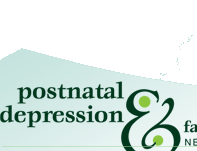 |

Bipolar disorder
To read the Introduction to Related Conditions Click Here
- Bipolar disorder can start for the first time after childbirth.
- It is more common than once thought.
- There are several types.
- At least 2% of the population suffer from bipolar disorder.
- A recent study also found that a further 2.4% suffered from a spectrum of bipolar-type mood disorders.
What is bipolar disorder?
Bi means two.
Polar is like the North and South poles which are at the opposite ends of the earth, its like the opposite extremes of something.
Bipolar mood disorder is when a person suffers from an episode of either mania or hypomania (see below).
If they have had one or more of these episodes it is called bipolar disorder (even though it might only be the manic pole that is evident).
Usually depressive episodes also occur, hence the two poles: mania/hypomania and depression.
For 75% of women, their first episode is a depression so at this stage they (and their treating doctor) dont know if it is what we call unipolar depression or whether it might be the first sign of bipolar disorder. (However there are some clues see Depression below).
Mania
- The main feature of mania is a sense of being revved up or energised.
- There is usually an over inflated sense of confidence or excessive planning.
- Mood is often said to be elevated but actually the person may feel awful (dysphoric is the technical name). A manic person may be bubbling with joy and enthusiasm or highly irritable.
- Thoughts are often sped up with lots of different ideas.
- Speech can be quite fast or pressured.
- Because of feeling overconfident, less cautious, and over friendly, many people do things they later regret or feel embarrassed about, e.g. ringing friends in the middle of the night, buying expensive or unnecessary things, beginning ventures they cant manage.
- Sexual interest can be heightened and lead to problems.
- The need for sleep is reduced significantly, sometimes very markedly and yet the person seems to have energy the next day.
- These symptoms may become severe and psychotic symptoms develop, e.g. a woman may believe that she is earth mother to all the worlds children, or that she is the best singer in the world or that her ideas for business will make her a millionaire by Christmas.
Hypomania
Hypo means less of something.
Hypomania is a less marked form of mania.
It is not severe enough to result in a person needing hospitalisation, but nevertheless it can be very disruptive for a person - particularly in their relationships.
Both mania and hypomania can go on for weeks or even months.
Mixed mood states
This occurs when there is a mixture of the symptoms of depression and mania/hypomania occurring in the same day.
It can be very confusing both for the sufferer and those around them.
It can be very difficult for a doctor to recognise (and diagnose). It can appear like an agitated depression. In fact there is alot of debate among psychiatrists about the overlap of these conditions
It is a state that needs proper assessment and treatment.
Depression
Depression is covered in our section on Postnatal Depression.
There are some features of depression which might suggest the possibility of bipolar disorder. These are:
- Severe episode.
- Psychotic symptoms.
- Early onset (before the age of 20 years).
- Onset of a major episode postnatally, especially if it was preceded by over exuberance.
- Marked slowing of thinking and movement and oversleeping.
- The presence of a family history of bipolar disorder (in parents, brothers, sisters, grand-parents, aunts, uncles or cousins).
Causes
Bipolar disorder runs in families there are powerful genetic components to the disorder, but people with no family history of bipolar disorder can also develop it. The reasons for this are not clear.
Childbirth is more likely to trigger an episode of bipolar disorder than anything else.
In a person susceptible to bipolar disorder a number of other factors may also act as a trigger. Examples of this include:
- Sleep deprivation - not surprisingly having a baby often leads to this.
- Stress.
- Physical illness.
- Certain medications including antidepressants.
- Certain illicit drugs.
- Travelling across time zones.
Treatment
The biggest block to good treatment is resistance to accepting the diagnosis. This is often a big problem because there are still many people who are ignorant about mental illness and for them there is a stigma attached to it.
A wide range of treatments are useful for bipolar disorder. These include:
- Bio-social rhythms (keeping certain regular routines).
- Medication.
- Stress reduction.
- Talking therapies.
Usually a combination of these treatments is needed.
It is important for the family to be involved in treatment decisions.
Mania : Vickis story
Vicki hadnt planned this pregnancy and it had taken a bit of getting used to. Labour was long and the delivery had gone OK under epidural. Vickis Mum had been present at the birth of baby Dean. Sometimes Vicki and her Mum didnt get on but since Deans birth her Mum had really been there for her.
Vicki was coping fantastically. Really, she couldnt see what all the fuss about having a baby was. Sure, the first few nights she had been up most of the night but since then she seemed to have heaps of energy. She had cleaned the whole house. Other people just seemed to be going too slow.
She was enjoying shopping and Dean didnt seem to mind the outings. She had spent quite a bit of money but hey, wasnt having a baby something to celebrate.
As time went on Vicki became more and more in touch with her inner feelings and the purpose of having Dean. He was gifted she could tell. Vicki was talking a lot much more and much faster than usual.
She was having ideas about starting a sewing business, she was sure she could sell thousands of dollars worth of her own label childrens clothes. She began staying up at night writing down her ideas but when she started ringing family in the middle of the night to tell them about her ideas they realised something was wrong.
Mixed mood state: Barbaras Story
Barbara was feeling "yuk", anxious, and wound up most of the time. Sometimes she just couldnt motivate herself to do anything, but often in the evenings she felt really tense and agitated and her husband Bob had told her to slow down.
Bella was ten days old now and it was so hard to understand her. Sometimes she couldnt think at all, couldnt decide what Bella needed or what to do with her. She kept forgetting what task she was in the middle of.
She didnt know where to put herself and for most of the day her mind just kept racing one thought after another. Everyone was irritating her no-one was going fast enough for her no-one understood and any suggestions they had were infuriating.
References
Barnes C, Mitchell P. Considerations in the management of bipolar disorder in women. Australian and New Zealand Journal of Psychiatry 2005; 39:662-673.
Freeman MP, Gelenberg AJ. Bipolar disorder in women: reproductive events and treatment considerations. Acta Psychiatrica Scandinavica 2005; 112:88-96.
Gentile S. Prophylactic treatment of bipolar disorder in pregnancy and breastfeeding: focus on emerging mood stabilizers. Bipolar Disord 2006; 8:207-220.
Jones I, Craddock N. Familiality of the puerperal trigger in bipolar disorder: results of a family study. American Journal of Psychiatry 2001; 158:913-917.
Jones I, Craddock N. Bipolar disorder and childbirth: the importance of recognising risk. British Journal of Psychiatry 2005; 186:453-454.
Merikangas, Kathleen R; Akiskal, Hagop S; Angst, Jules; Greenberg, Paul E; Hirschfeld, Robert M. A; Petukhova, Maria; Kessler, Ronald C. Lifetime and 12-month prevalence of bipolar spectrum disorder in the National Comorbidity Survey Replication. Archives of General Psychiatry. Vol 64(5) May 2007, 543-552.
Viguera AC, Nonacs R, Cohen LS, Tondo L, Murray A, Baldessarini RJ. Risk of recurrence of bipolar disorder in pregnant and nonpregnant women after discontinuing lithium maintenance. American Journal of Psychiatry 2000; 157:179-184.
Ward S, Wisner KL. Collaborative management of women with bipolar disorder during pregnancy and postpartum: pharmacologic considerations. J Midwifery Womens Health 2007; 52:3-13.
Yonkers KA, Wisner KL, Stowe Z, Leibenluft E, Cohen L, Miller L, Manber R, Viguera A, Suppes T, Altshuler L. Management of bipolar disorder during pregnancy and the postpartum period. American Journal of Psychiatry 2004; 161:608-620.
|
 |







